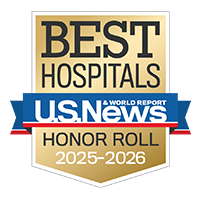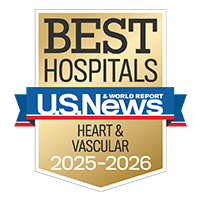Ventricular Septal Defect

Overview
A ventricular septal defect (VSD) is a hole in the wall or septum of the heart that separates the left and right lower chambers, called ventricles. This hole allows blood to flow from the left ventricle into the right ventricle instead of flowing in the aorta, the main artery that sends oxygenated blood to the rest of the body. Blood from the right ventricle is pumped into the lungs. VSDs are the most common form of congenital heart disease.
Our Approach to Ventricular Septal Defect
UCSF provides comprehensive, highly specialized care for adults living with heart defects such as ventricular septal defect. Our dedicated team of experts offers a wide array of services, including thorough medical evaluations, advanced treatments, long-term monitoring, and personalized recommendations on diet, exercise, psychosocial support and family planning.
Awards & recognition
-

Among the top hospitals in the nation
-

One of the nation's best for heart & vascular care
Signs & symptoms
Symptoms of a large ventricular septal defect occur from the increased workload on the heart. If the hole in the ventricular wall is large, symptoms may include shortness of breath. The heart also may enlarge and pulmonary hypertension can result.
Diagnosis
Most ventricular septal defects (VSD) are discovered during childhood because a murmur, an extra heart sound, is heard during a physical examination. In addition to a physically exam, your doctor may suggest tests including:
- Chest X-ray to see the heart's size
- Echocardiogram, which is an ultrasound examination of the heart
- Electrocardiogram (EKG or ECG), which records the heart's electrical activity
Treatments
Small holes often close without treatment. If the hole is large, it may be treated either with drugs or with open-heart surgery, usually performed in childhood. The surgery consists of covering the hole with a patch, which eventually is covered by normal heart lining tissue. Small holes may be closed without a patch.
Adult patients with a ventricular septal defect (VSD) should be seen by a cardiologist specializing in the care of adults with congenital heart disease to monitor for late complications. Some patients may need to take antibiotics during subsequent surgeries or dental procedures to protect against endocarditis. VSD patients should consult their cardiologists regarding the need for antibiotics.
Most people whose VSDs were repaired in childhood don't have any long-term heart problems. However, some may require continuous treatment with diuretics and blood pressure medications to help the heart pump better. If there is a leak around the VSD patch, patients should continue to receive endocarditis prevention treatment.
Rarely, a patient develops pulmonary hypertension. This can cause a condition called Eisenmenger's syndrome. While women with small or repaired VSDs generally are not at increased risk for pregnancy, those with Eisenmenger's syndrome are at very high risk. If you are pregnant and have Eisenmenger's syndrome, the use of antibiotics for endocarditis prevention should be discussed with your obstetrician.
UCSF Health medical specialists have reviewed this information. It is for educational purposes only and is not intended to replace the advice of your doctor or other health care provider. We encourage you to discuss any questions or concerns you may have with your provider.










